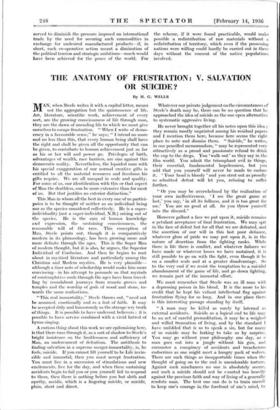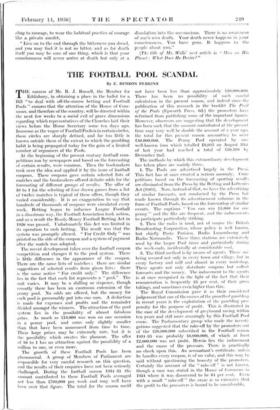THE ANATOMY OF FRUSTRATION : V. SALVATION OR SUICIDE
By H. G. WELLS MAN, when Steele writes it with a capital letter, means not the aggregation but the quintessence of life. Art, literature, scientific work, achievement of every sort, are the growing consciousness of life through man, they are the dawn of unending life to which we must give ourselves to escape frustration. " When I write of demo- cracy in a favourable sense," he says ; I intend no more and no less than this, that every human being shall have the right and shall be given all the .opportunity that can be given, to contribute to human achievement just as far as his or her will and power go. Privileges of birth, advantages of wealth, race barriers, are sins against this democratic reality. Nevertheless, the lopsided man with his special exaggeration of our normal creative • gifts is entitled to all the material resources and freedoms his gifts require. We are all unequal in scale and quality. For some of us, our identification with this or that aspect of Man the deathless, can be more extensive than for most of us. But that justifies no exterior distinction."
This Man.in whom all the best in every one of us partici- pates is to ho thought of neither as an individual being nor as the species considered collectively. He is a super- individuality not a super-individual, N.B.) arising out of the species. He is the sum of human knowledge a4; d expression, the sustaining consciousness, the reasonable will of the race. This conception of Man, Steele points out, though it is comparatively modern in its phraseology, has been growing more and more definite through the ages. This is the Super Man of modern thought, but it is also, he argues, the Superior Individual of Confucius. And then he begins to rout about in mystical literature and particularly among the Christian and Moslem mystics. He is very plausible— although a finer note of scholarship would make him more convincing—in his attempt to persuade us that myriads of contemplative souls through the ages have been travel- hng by roundabout journeys from remote groves and temples and the worship of gods of wood and stone, to- wards the same realisations.
"This real immortality," Steele throws out, "need not be assumed, emotionally and as a feat of faith. It may be accepted drily and humorously as-the strange wry truth of things. It is possible to have undevout believers ; it is possible to have service combined with a vivid hatred of hymn-singing.
A curious thing about this work we are epitomising here, is that there runs through it, as a sort of shadow to Steele's bright insistence on the limitlessness and sufficiency of Man, an undercurrent of defeatism. The antithesis to finding salvation in a supreme merger-immortality, is, he feels, suicide. If you cannot lift yourself to be Life invin- cible and immortal, then you must accept frustration. You must live in a succession of stimulations and new excitements, live for the day, and when these sustaining accidents begin to fail you or you yourself fail to respond to them, then there is nothing before .you but sloth and apathy, accidie, which is a lingering suicide, or suicide, plain, short and direct. Whatever our private judgement on the circumstances of Steele's death may be, there can be no question that he approached the idea of suicide as the one open alternative -to systematic aggressive living. .
He never brought together all his notes upon this idea ; they remain mostly unprinted among his residual papers and I mention them here, because here seems the right place to note and dismiss them. " Suicide," he 'writes, in one pencilled memorandum, " may be represented very attractively as a proud and passionate refusal to drink the cup to the dregs. You walk out' as they say in the film world. You admit the triumphant evil in things, their essential, fundamental hopelessness, but you add that you yourself will ' never be made to endure it. ' Your head is bloody ' and you strut out as pioudly as admitted defeat will let you, refusing to suffer further.
" Or you may be overwhelmed by the realisation of your own ineffectiveness. ' I sec the great game at last,' you say, in all its fullness, and it is too great for me.' You are no good at all. So you throw yourself into the discard."
However gallant a face we put upon it, suicide, remains a petulant acceptance of final frustration. We may spit in the face of defeat but for all that we are defeated, and the assertion of our will in this last poor defiance, whatever gloss of pride we may put upon it, is in the nature of desertion from the fighting ranks. While there is life there is conflict, and whatever failures we have made or whatever losses we have sustained, it is still possible to go on with the fight, even though it be on a smaller scale and at a greater disadvantage. So to the very end if we resist the temptation to a suicidal abandonment of the game of life, and go down fighting, we remain part of the immortal effort.
We must remember that Steele was an ill man with a depressing poison in his blood. It is the more to his credit that he kept his valiant intellectual flag against frustration flying for so long. And in one place there is this interesting passage standing by itself.
" A man may be killed as surely by internal as external accidents. Suicide as a logical end to life may be an act of careful premeditation, it may be a weighed and willed truncation of living, and by the standard I have unfolded that is so to speak a sin, but for many of us suicide may be lurking to take us by surprise. You may go without your philosophy one day, as a man goes out into a jungle without his gun, and encounter a conspiracy of accidents and • treacherous endocrines as one might meet a hungry pack of wolves. There are such things as insupportable times when the thought of going on to' the end is unendurable torture. Against such mischances no one is absolutely secure, and such -a suicide should not be cDunted too heavily against the previous faith and way of living of a generally resolute man. The best one can do is to train oneself to keep One's courage in.the forefront of one's mind, to cling to courage, to wear the habitual practice of courage like a. private, amulet, " Live on to the end through the bitterness you dread, and you may find it is . not so bitter, and as for death itself yOU may be sure of one thing, which is that your consciousness will never arrive at death but only at a dissolution into the, unconscious. There is no awareness of one's .own death. Your death never happens in your consciousness. You have gone. It happens to the people about you." . .
[The title of Mr. Wells' next article is "flan on His Planet: What Does He Desire?"















































 Previous page
Previous page